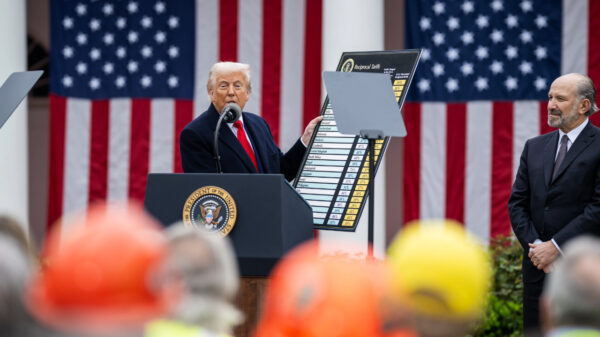Staff Writer Lara Bevan-Shiraz attended KCL Labour’s ‘An Evening with Neil Kinnock’ and reports on the event as well as their rich discussion afterwards.
Lord Neil Kinnock served as Leader of the Labour Party between 1983 and 1992 opposing both the Thatcher and Major governments. He was the Member of Parliament for Islwyn, 1970-1995, and subsequently served as Vice-President of the European Commission, 1999-2004, before entering the House of Lords in 2005.
Rapturous applause fills the Bush House Auditorium, although our speaker hasn’t even commenced. Neil Kinnock steps right up to the edge of the stage and bellows: “Can you hear me?” He needn’t ask: the 82-year-old’s voice reaches every corner without a microphone. And so began Kinnock’s “appeal” to our generation.
“An Age of Anxiety”
We are midway in a game of chess, cornered but not yet beaten. This is the state of play evoked by Kinnock in his opening speech, laying bare his concerns for the present, as he pinpoints the insecurity stifling our society. Brassily facing us on the board, baring their weapons and ready to move, are the representatives of disorder: “populism, and its first cousin fascism”.
We live in an “Age of Anxiety” with a “proliferation of wars” and the absence of the reassurance of a global balance of power. Kinnock perceives this unease permeating all spheres, “right down to the personal”. The promise of social mobility has fallen through, and hope is ebbing low. And what “terrifies” Kinnock most of all, particularly as a grandfather, is that our generation is “daunted”, “inhibited” from experiencing “happiness” and personal fulfilment.
Prompt action, he urges, is imperative to prevent this trend from becoming the “dominant feature” of the present. The left must not only demonstrate how it “embodies and embraces security” through traditional concepts of legal frameworks and defence, but also “enunciate the security of creativity, realistic aspiration, protection, and projection”.
However, Kinnock warns: this responsibility resides not just with the new Labour Government or the political left, but with society at large to counter the allure of fascism’s “simple answers”. In particular, our younger generations must “resist”: we’ve got to “get in the way, use the truth of personal relations”, says Kinnock.
Following these opening remarks Kinnock took his seat alongside his hosts, KCL Labour’s Co-Chairs Callum McGee and Alex Kyriacou, they got stuck into a discussion that spanned his political socialisation and career. Throughout the evening the audience heard the former Labour leader’s thoughts on: the current government, the challenges of misinformation and social media, geopolitical threats, and climate change. With all these presenting challenges to ensuring fair and accessible pathways to self-actualisation, self-transcendence, and a sense of community for all.
Considered and passionate, Kinnock’s every answer presented a masterclass in rhetoric: his comprehensive responses seeking every ear.

“Everything that was good was because people had gotten together”
Kinnock’s plea is not just for our generation to take action regarding our immediate challenges, but also to accept the insights his generation has to offer. In transmitting these, he seeks to develop our collective memory, thereby giving us the tools with which to assume our own authority and power—echoing his consistent message of “collective strength”.
His concerns for the youth today stand in contrast with his own childhood and formative experiences. The power of the collective is a recurring theme in Kinnock’s conversation. Political socialisations (the formation of our political identities) are often dominated by the family—people are often a lot more like their parents than they like to admit—and for Kinnock, the personal really is political.
At 12, he came to the conclusion that “everything that was good [in his community] was because people had gotten together and chipped in for services they couldn’t otherwise afford.” Resultantly, he joined the Labour party at 14, with this identification “assisted” by the luck of having the “magical figure” Aneurin Bevan as his Member of Parliament. Bevan created the NHS in 1948 using Tredegar’s Medical Aid Society as a blueprint: “literally by the pennies of the workforce!” For Kinnock, “that practical reality of the advantages I lived with, coming as a direct irreplaceable consequence of collective activity—that makes you a socialist.”
Kinnock’s brand of socialism is far from Cold War misconceptions of homogenised collectivism, rather rooted in the “the huge advantage of individual liberty that derives from collective provision”.
“No women with their hands up… bloody hell!”
As the Q&A was thrown open to the audience, the hosts began to pick out hands from the near-on full house of KCL, LSE, and City students attending. Suddenly, however, Kinnock took a concerned tone: “No women with their hands up… bloody hell!” He says this reflexively, naturally and doesn’t linger, just bringing our attention to how odd it indeed is. Prompted, some women do raise their hands, and of the five audience questions of the evening, two are asked by women.
After the event, Kinnock exchanged his thoughts on the many reasons why women don’t put and keep their hands in the air as often. It’s an issue he has long had care and attention for, having seen his wife, Glenys, and other women who “were very useful members of society, immensely practical minded, multilingual” nevertheless struggle with confidence, needing a nudge before going on to have “highly socially useful” careers. An ally in practice and in words, during his leadership, Kinnock opened up pathways to facilitate female promotion into his shadow cabinet, and took the men who challenged this head on.
I raised the fact that men chronically pinch women’s ideas (a trend known as “bropriation”, something women in the Obama Administration tackled head on), and that these same ideas receive more attention when repeated by a man, with credit going to the repeater as opposed to the initiator of those ideas, as well as how men can encroach on women’s work, perhaps even thinking they are being helpful, with this being chronically undermining. On the one hand women’s ideas are recognised—as worth pinching, but on the other they are being stealthily undercut. Kinnock—ever the iterative wordsmith—lit up in response, reflecting further on the obstacles impeding women’s progress to “self-actualisation” and coining derivatives such as “brodescend”, “brotronise”, and “broelp”.
Kinnock, who was the Shadow Secretary of State for Education (1979-1983), is also attuned to the fact that another of the reasons girls can shed confidence is other girls, in school, and the unhelpfulness of “senior” women in work and adult life. As well as being concerned that girl’s confidence undergoes a “noticeable and measured” dip during the pre-teen years, he is concerned that boys are underperforming. He believes there is a “need to change the 11-14 curriculum to make it much more interesting than it is…we’ve got to stimulate the boys and encourage the girls but God knows how we do it.”

Credit: Martin Parada Berrios
“If they can get away with lies, we can get away with the truth!”
In the public mind, politics is often synonymous with spin, and resultantly, whoever offers the greater spin gets to control the narrative. For this reason, Kinnock disposes with the classic writerly advice of “show don’t tell”, rather insisting the need for almost a “show and tell” style of communication from the Labour government, comprising “truth, realities, facts, [and] details”. Wryly recalling the “fiction” of coffers run dry by Labour mismanagement concocted by “Cameron and Osbourne” around a note (written in jest) by an outgoing minister, he quips: “we can get away with the truth!”
As a case study, Kinnock flips the script on public debt, arguing that it’s not as abnormal or perilous as the Conservatives make it out to be. With the national debt from the Second World War having only been paid off as recently as 2006, he jokes that we probably paid the last of it off buying “sweets” with our pocket money. With debt, he says we have a “choice between leaving a small amount of debt… likely not noticed… and the danger of under investment”. For Kinnock, the answer is clear—”audacity and confidence” with “increased borrowing” put to “strategic use”. The public must be “informed”. It’s all about “maximising transparency to show [they] are doing it”.
Kinnock expanded to Roar later in our interview: “progress doesn’t come by itself and it doesn’t automatically register in the human brain. But people appreciate it when they see it and so you’ve got to show it.” To illustrate, Kinnock references the inauguration of the National Health Service in 1948, the Labour government pursued a leafleting campaign to “inform” the public of the new services being provided, crucially “showing they wanted to tell the public and that’s half the battle. If people can understand that the government is trying to inform you, factually, honestly, then that goes a long way to confidence in democracy.”
Reconciling Idealism and Pragmatism
Kinnock rose to prominence as a perceived “left-winger”, though he would become well known for taking his party to the centre over the course of the 1980s. He previously worked as Vice-President of the European Commission and it’s no secret that he would like to see a more radical reconciliation with Europe.
However, when Roar asked whether he feels Labour have moderated too far, Kinnock again shows his grandfatherly side, with a coy manner as if he doesn’t wish to criticise the parents in front of the grandchildren: only letting on that he feels they may come to “regret the solidity and scale” and “refusal to contemplate” closer ties to the EU in terms of re-joining a single market and potentially regaining membership. He does, however, believe that by taking “small steps” they can restore the fractured relationship “cumulatively”, advocating for a “practical patriotism”.
“We’ve got more women than they’ve got seats—brilliant!”
Kinnock likens the current state of the Conservative party to “a circular firing squad”, adding that they “haven’t got a cogent understanding of why they’re in politics”, rather a directionality that “passes as ideological”, which is “guaranteed to inflict division.” Whilst celebrating jubilantly: “we’ve got more women [186] than they’ve got seats [121]—brilliant!”, Kinnock is nevertheless cautious, seeing their disunity as unreliable. He predicts that “they will frighten themselves” out of it, with at least one more change of Tory leadership before the next election.
He recognises that support for Labour is “15 miles wide and 2 inches deep” but says that attaining this breadth was strategically “necessary to get the extension of democratic power”, to avoid the country being “condemned to years of managed failure”. He warns that they must not squander this mandate and, with all verbal versions of typographical emphases, reiterates his call for demonstrative communication: “explain, explain, explain!”
Labour need to demonstrate how they “represent security”
When asked for his thoughts on tackling the rise of fascism both at home and across Europe, Kinnock argued the left must “represent security” to counter the “manipulation” and “alienation of whole regions”. The perceived “threat to way of life” manufactured by malicious actors requires pinpointed counterarguments to demonstrate how “immigration is fundamental”, as otherwise our older generations will become ever more “isolated and neglected”.
He thinks the left must be “comprehensible and not offensive” to help people “see it as what it is”: there will be 2.5 people of working age per pensioner in the UK by 2035 and by 2050, just two per pensioner. At the same time, Kinnock feels that a utopia with open borders is impossible in a “world so unbalanced” by climate change and asymmetrical economics, and thus we need “managed migration” balanced by the “nourishment of domestic skills”.
“You must succeed, you cannot afford to fail”
On social media, misinformation and Elon Musk, Kinnock commented that there are “wicked… distorting” elements that “exist with or without social media”, but believes that it is imperative that an “alliance” is created between the “vested interests” of the “Zuckerbergs” and the “legal systems of democracies”. He feels we have a narrow “window” during the “lifetimes of [the current] technos”, most of whom he feels are “sensitive to the consensus of the public and [the] responsibility to the law”. Again, he urged us, in concluding the Q&A, “you must succeed, you cannot afford to fail”.

hoping to catch a word, snap a photograph, or steal an autograph.
Credit: Sinem Tunali
Generous with his time for further questions and political engagement, Kinnock clearly thrives off the buzz that surrounds him and the seamless intergenerational dialogue he generates. In both speech and text, he continuously reworks to find the most precise words to “land a blow” to the inequalities and challenges that persist. This creates his unique, richly-layered oratory and prose that is simultaneously long-form and infused with momentum.
He recalls with fondness his own time chairing the Socialist Society at Cardiff University alongside his beloved Glenys: “I chaired Harold Wilson’s first public meeting as Leader of the Labour Party, elected on a Thursday and he honoured an undertaking he’d taken before to come and speak on Friday in the student’s union in Cardiff, which I always thought was considerably to his credit”. Kinnock says he never imagined that he would one day fill the speaker’s shoes.
“The advance is slow, but it is continual”
Kinnock’s advice to all youngsters is “only what I say to my grandchildren: just work hard and be yourselves – remember that you’re as good as anybody else. No better. Just as good.” For those going into politics: “never treat politics as a career, don’t refer to it as a career, don’t treat it as a career, because it’s a lucky vocation, and that’s it”. And for women: to keep putting our hands in the air with more persistence and perseverance than ever. Signing off an email, he kindly advises: “keep slogging with sweet reason – the advance is slow, but it is continual.”
















